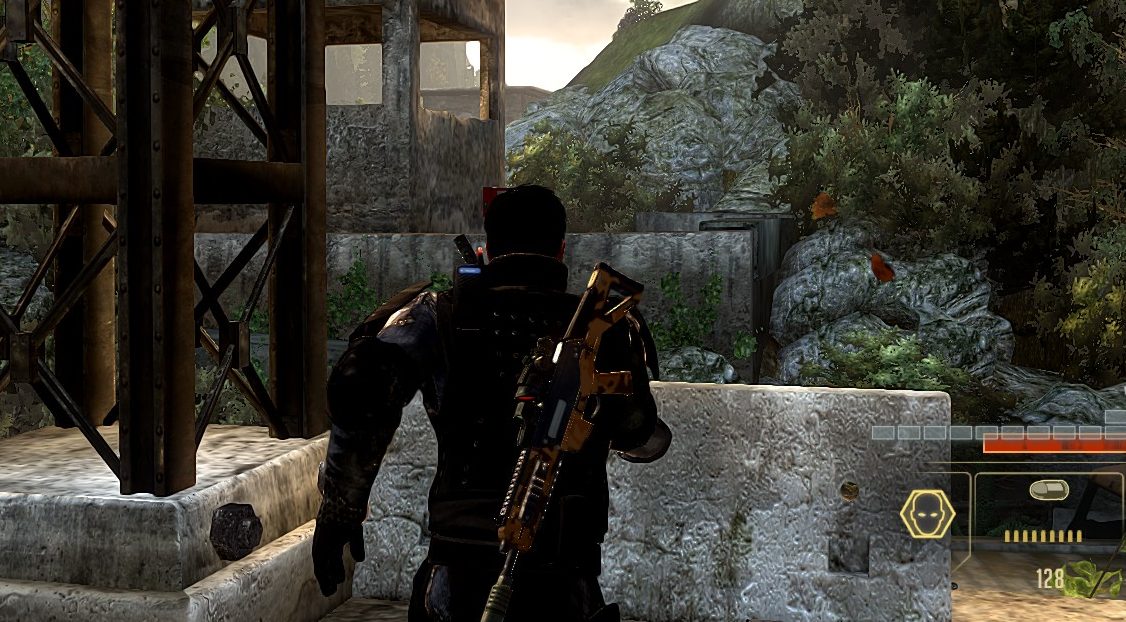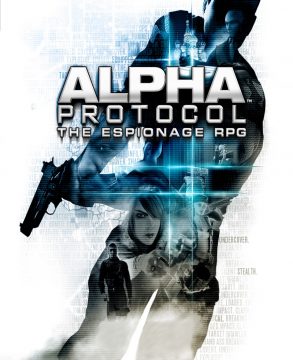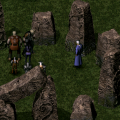It should have become the ultimate interactive spy action RPG epic. As super spy Mike Thorton, you’d infiltrate enemy hideouts like Splinter Cell‘s Sam Fisher, threaten, flirt and manipulate everyone around you like Mass Effect‘s Commander Shepard, hack like Stanley Jobson in Swordfish and score with more women than any of them in your spare time. Adding a complex reputation system based on personal interactions and more freedom of choice than in 99% of RPGs, surely it had to become the alpha and the omega to espionage gaming, if not all of the vast genre of “Games Where You Kill People a lot, but sometimes talk to them”.
Well, Alpha Protocol came and went, and even though no one can deny it was one of the most interesting and ripe with potential games in a mainstream genre in the last couple years, it didn’t revolutionize anything, wasn’t terribly successful, and didn’t leave much of an impact whatsoever. What went wrong?
There are many problems, some technical, some regarding the script. The first place to start is with the story. The cast of Alpha Protocol is huge, so listed here are only the more important and/or colorful characters:
Michael Thorton
The hero of the game. While his visual appearance is customizable to some degree, he’s always basically the same guy. He only recently joined Alpha Protocol for reasons unknown, but is already put on a top-priority mission.
Mina Tang
As one of the “handlers” that back Thorton with support through a headset, she’s the first person he comes in contact with at Alpha Protocol, and also the only one who keeps supporting him after he’s supposedly gone rogue.
Scarlett Lake
A photojournalist Thorton coincidentally(?) meets on a plane. In exchange for hot stories about Halbech’s corrupt affairs, she may help him out on his mission in Taiwan.
SIE
Only known as “SIE” (German for “she”), this tough mercenary used to be an agent for the Stasi in East Germany, before joining the private paramilitary organization VCI (Veteran Combat Initiative). She really likes to shoot people, and flirts with Thorton a lot. Thorton first meets SIE in Russia, but if she likes him, she may get involved in other missions, too.
Madison Saint James
A former subordinate of Marburg at Halbech, she feeds Thorton information on his enemy in Rome. Eventually Thorton decides to bring her to his safehouse for protection, of course only for her to get kidnapped to trigger a cheap plot device (see below).
Sis
At one point, Thorton finds himself attacked by this mute orphan girl and a bunch of mercenaries. If he lets her live, he gets on good footing with her mentor, who goes by the codename Albatross.
Albatross
Albatross is the leader of the G22 faction, a group of operatives of unknown affiliation, but rivals to SIE’s VCI. As they pursue similar goals to Thorton, they get involved in a lot of missions, and being with or against Albatross (and by extension the G22) can have a big influence on those.
Sheik Ali Shaheed
Leader of the Al-Samad and declared enemy of the United States. Somehow he obtained high-tech missiles made by the Halbech corporation, triggering Thorton’s first assignment, at the end of which he is executed. Or is he?
Konstantin Brayko
A young, loud and garish upstart in the Russian mafia, Brayko is a total crackpot, obsessed with 1980s American culture and sniffs more cocaine than Tony Montana, Mia Wallace and Fredo Corleone combined.
Conrad Marburg
Alpha Protocol’s friendly neighborhood narcissistic psychopath interrogator, Marburg is Thorton’s adversary in Rome. Always keeping his cool, he’s only eaten away by the fact that he’s a subordinate to Leland.
Omen Deng
A legendary assassin and independence fighter. Thorton learns that he’s out to assassinate Taiwan’s president during a public rally, but even finding him proves not as easy as it sounds and requires getting involved with triad bosses.
Steven Heck
Thorton’s contact in Taipei is a total nutjob – the kind who likes to build bombs and torture random people in his basement. Always suspecting a conspiracy at every corner, he nonetheless has valuable insight into Taiwan’s underworld, making him indispensable for the mission, but due to his unstable personality he’s a liability at the same time.
Henry Leland
Leland is the big shot at Halbech, who orchestrated Thorton’s framing for his own goals. Most of the game actually takes place in flashbacks, while Leland interrogates Thorton after he’s been captured by Alpha Protocol.
From the outset, Alpha Protocol seems strange – it doesn’t seem like there ever was a definite decision as to how serious the plot was to be taken. On the one hand you’ve got the life-like representation of a contemporary Muslim terrorist threat through the fictional Al-Samad organization, a stolen missile crisis, the ultra-secret government agency Alpha Protocol, whose mission is not only to stop the terrorists, but also to cover up any possible embarrassments for the US, and the corrupt military contractor Halbech, which is backed by strong lobbying in the government.
Then, just when you start to feel uncomfortable at all this shameless exploitation of recent political themes, it decides to turn into a parody of itself. Things go very badly on the initial anti-terrorist mission in Saudi Arabia, Thorton is framed for siding with the terrorists and ends up as public enemy #1. On his quest to stop the real traitor and restore his reputation, he travels to Russia, Taiwan and Rome, meeting more and more weird goofballs and Bond villains on the way. Enjoy an overly enigmatic Taiwanese assassin/independence fighter in fancy dictator uniform, a Russian Tony Montana-wannabe with an ’80s obsession, who beats your ass down by bringing knifes to a gunfight and powers himself with the invincibility powers of cocaine, or a psychotic inquisitionist who always talks in a creepy calm voice and never takes off his black gloves. For some reason the villains also always seem all too keen on blaming Thorton for their deeds, because after all he’s the real evil for not stopping them properly and/or putting value on human lives instead of profit in the first place. They’ll go to any length claiming moral superiority, even when they might have just blown up an orphanage.
Speaking of orphans, in another weird twisted attempt of moralizing/shocking the player, among its abundant statistics the game keeps track not only of the total number of enemies killed, but also the amount of orphans you’ve become guilty for during your missions. There are some funny results of stereotyping to examine here: The Arab terrorists all have about half a dozen children, while everywhere else it’s almost invariably one or two. And who’d have guessed, childless mercenaries are apparently extremely rare.
Some words have to be said about the way Alpha Protocol treats its female characters, too. Whenever you meet a specimen of this extraordinarily rare gender, you’ll know you definitely have the chance to get in bed with her further down the line. Unless she’s a mute underage psychotic killer. Coquettish mature psychotic killers are good to go, of course. All the while they’re some of the most interesting and important characters in the whole game, and almost the only ones that may play a significant role over several missions. It feels weird to have them all (minus one) boil down to possible opportunities to get laid.
What the story’s supposed to be all about, though, are the ways the player’s decisions influences events. For every sentence Thorton speaks towards his friends and enemies, the player gets to chose between three different stances, just like in Mass Effect. But Obsidian actually tried to simulate a natural conversational flow, so the replies are timed and you gotta have a quick wit to not end up with the default choice. Also different is the weighting of the three stances. While in Mass Effect the choice usually boiled down between being a goody two-shoes, a violent and racist prick, and a bland diplomat in the middle, Thorton can behave like a goody two-shoes/sometimes nationalist prick, a gruffy mercenary who gets the job done/sometimes violent prick and a suave smoothtalker/sometimes womanizing prick. Occasionally you also get the chance to ask for specific information, at other times Thorton can end negotiations and take action—usually in the form of either executing someone or not.
Depending on whether or not people like what you say to them, you get or lose loyalty points with them. (Here it resembles another Bioware game, namely Dragon Age Origins.) Although you never know beforehand what exactly Thorton is going to say, it’s not simply a hit-or-miss matter, as the personalities of most characters are somewhat coherent, and during the game you gather dossier information of everyone and everything, which gives hints to how people tick (and for some reason a full dossier is rewarded with a damage bonus). The mechanic is surprisingly powerful, as eventually it’s possible to turn to your side whoever you want or piss off whoever you want. There’s even an achievement for befriending all enemies in one single playthrough.
The only problem: Whenever there is a really stupid decision to be made that happens to be convenient to the plot, Thorton won’t hesitate a second to ask for your consent. Like when he pisses subtlety away by assaulting the hideout of the crazy Russian mafia boss with a military unit in a armored attack vehicle (complete with dull turret gun sequence), or when he constantly agrees to meet the guy with the wet dreams of being a Gestapo investigator on his terms, and eventually gets Madison Saint James, the perfect blackmail bait bimbo, involved in the troubles. And of course she ends up getting abducted and used as a device for the tired old “moral dilemma” mission. In a pathetic moment of “We force the player to make hard decisions! Look how deep we are!”, Marburg forces Thorton to either go rescue the chick or disarm some explosives that threaten to blow up a museum wing full of civilians (of whom you never see a single soul should you decide to go that route). That plot device not only has been beaten to death by now, the execution also makes no sense at all. When you go to rescue the woman, you have to use your inhuman super agent skills to headshot three guards that use her as a human shield within 1 second from 150 feet away, or she ends up dead anyway. When you go for the explosives, however, Marburg shows up with her and sends her towards Thorton, only to shoot her in the back for him to watch her die. That this situation would have been much easier to resolve in-engine than the rescue mission variant, with the villains less than 100 feet away and a clear line of fire to all of them, the writers didn’t care.
That was a lie. Actually the situation wouldn’t have changed in-engine, cause Marburg is a boss enemy, and bosses eat bullets for breakfast and have a faster healing factor than Wolverine. Suffice to say, they are total bullshit. While the whole rest of the game is setup to facilitate the three approaches of a gunman, a sneaky guy and a tech expert, here all you can do is fire away. That can put the sneaky guy in a tight spot, especially when you make the mistake and take on a boss without completing many other missions for experience first. (Although the total amount of EXP to be gained in the game is finite, Thorton can travel freely between the three main locations and do missions everywhere, narrated urgency be damned.)
That doesn’t mean that the actual missions are better balanced, though. While it’s possible to specialize in four different weapons, melee fighting, gadgets or hacking, the only skills Thorton ever really needs are the pistol and stealth skills. A fully upgraded handgun skill allows Thorton to target five shots in all tranquility and fire them all at once before the enemies even know, while a high stealth allows him to go literally invisible and sneak around right in front of their eyes. When concentrating all awarded ability points on these two skills, Thorton becomes an invincible superninja at about the halfway point. Unless you’re on the “recruit” career, which starts Thorton with no skills at all, but opens up a handful of new dialogue options and unlocks a New Game+ mode at the end. Then it might take a little longer. There’s not much point in going for hacking or lockpicking skills, as it just makes the obligatory mini games easier, which aren’t that hard to begin with. And the other weapons can never make up with deadliness for their lack of subtlety.
Then there are the technical issues. Since Alpha Protocol is a game made by Obsidian Entertainment aka ex-Troika Games aka ex-Black Isle, there was really no way around them. That said, it somehow didn’t turn out a total trainwreck of Ultima IX or Gothic 3 proportions. In its fully patched state, the worst that’s likely to happen is that all enemies in the current level portion just disappear upon reloading a checkpoint. Sometimes cowardly terrorists may retreat into walls, where they are untouchable by melee attacks or silent takedowns. The funniest glitch has to be a really silly oversight in cutscene direction: During the interrogation scenes with Leland, Mike Thorton will always have his head trimmed, no matter what haircut the player chose for the “flashbacks.” His tan, beard and eye color, however, appear just as in the last completed mission. Cut together into one complete scene, the interrogation is hilarious.
In the end, Alpha Protocol didn’t become the ultimate interactive spy action RPG epic. Stumbling more often than not over its own ambitions, it nonetheless clearly showed the way of what could make the ultimate interactive spy action RPG epos. And it’s even still a blast to play, despite its flaws. The missions may all play out somewhere between a typical cover shooter and a typical stealth game, depending on your specializations, but ultimately it’s the interactive dialogues, peculiar characters and diplomacy simulation elements that give the game a very unique and entertaining flavor and provide the necessary context to make the missions as engaging as they are. But alas, simply showing the way in the video game industry all too often amounts to nothing at all, and Alpha Protocol already seems all but forgotten, making way for “more of the same” instead, as usual.
Alpha Protocol screenshots taken from giantbomb.com / the Whiskey Media community.






































